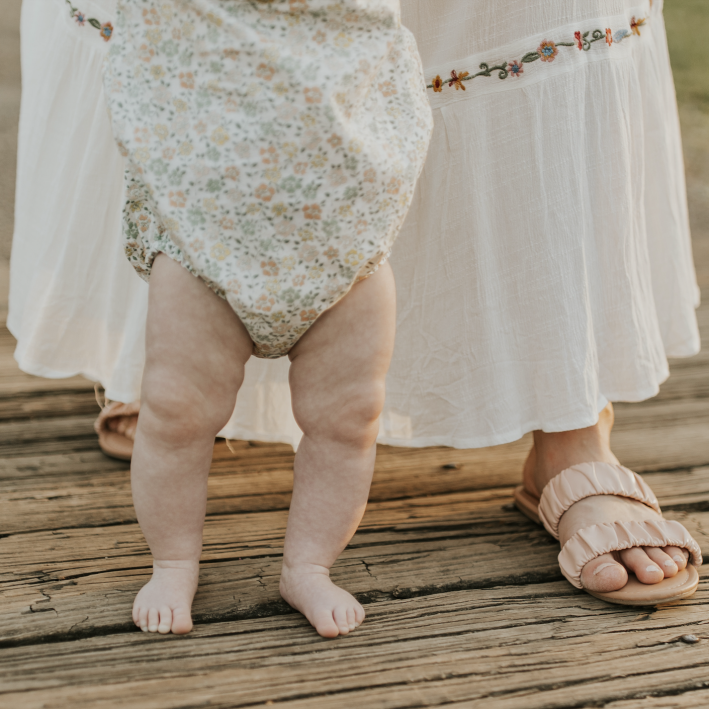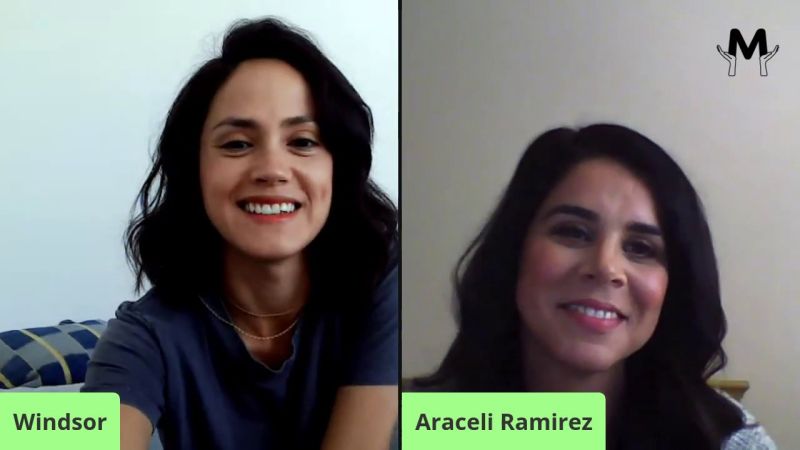Navigating Postpartum OCD: Words Of Advice From A Mom Who Survived
Practical tips for mothers struggling with taboo intrusive thoughts about their children.
Escrito por Briagenn Price

01 When Briagenn experienced a sudden onset of postpartum OCD, she had no idea how to manage her intrusive thoughts.
02 Now having gone through treatment, she shares recovery tips in hopes of helping other struggling mothers.
Trigger warning: suicide, pedophilia intrusive thoughts, harm intrusive thoughts
Navigating the ins and outs of Postpartum OCD was the most terrifying, traumatic experience of my life. One day, I was excited to bring my baby daughter home from the hospital and dress her in a newborn onesie, and the next, I was accosted by intrusive thoughts about sexually abusing her. Then, those thoughts devolved into ones about killing her.
Before getting diagnosed with OCD, I thought I understood mental illness. Sure, depression and anxiety suck, but they’re easy enough to power through. Oh, how naive I was. Postpartum OCD shook me to my core, made me question my reality, and convinced me that I was a disgusting, dangerous person. I believed, wholeheartedly, that my family would be better off if I were dead.
Now, thankfully, I know that’s not true. But it’s been a journey through hell and back to get here. During my initial stages of recovery, I did everything I could to educate myself about OCD. I found community by joining a postpartum OCD support group on Facebook and attending an OCD support group for moms through Postpartum Support International. There, I shared my deepest, darkest secrets, and met other mothers who also struggled with taboo intrusive thoughts about their kids. I read every recovery story I could find about OCD, and I wanted details about how to get there myself. I made a promise that if I ever got to the other side, I’d share recovery tips to support struggling mothers. So, here’s my list — I hope it helps.

Maternal Minds: Postpartum OCD
Talk To People
I can’t think of anything more embarrassing than admitting you’re having intrusive thoughts and images about sexually abusing your beautiful, innocent baby girl. I mean, what could be worse? When my journey with postpartum OCD began, I thought my obsessions were a dirty secret I’d take to the grave. Never in a million years did I imagine I’d write about my experience for the world to read. Yet, here I am. I started slowly by posting quotes and memes on my Instagram story. The more openly I talked about my postpartum OCD struggles, the less shameful they became.
Medication
Some people say medication is not for everyone, but it’s definitely for me. That said, it took a while to find one that made a noticeable difference. Initially, I tried Zoloft/Sertraline, then Anafranil/Clomipramine, and then eventually stuck with Prozac/Fluoxetine. To quote my therapist, when I finally felt the medication working, it was like “the sunshine was peeking through the clouds.” Prozac/Fluoxetine didn’t fully get rid of my OCD, but it made it more of an “annoyance” — like a fly buzzing around in the background of my mind, rather than a 14,000-pound elephant barging its way through.
Urges Are A Part Of OCD
This one is tough to admit, but I believe it’s important. Unwanted urges or impulses are a symptom of OCD, just like intrusive thoughts. If you’ve ever felt the “urge” to jump off a balcony, swerve your car into traffic, or shout something profane, you’ll know what I mean. In the throes of postpartum OCD, I was terrified of getting unwanted urges or impulses to sexually abuse my baby. I was on constant alert for them — a compulsion called “somatic checking.” When I learned to radically accept these unwanted urges and impulses as OCD and nothing more, they slowly started to fade.
OCD Makes You Doubt Everything
OCD is commonly called the “doubting disorder,” and for good reason. Postpartum OCD made me doubt whether or not I wanted to abuse or kill my baby, to the point where I no longer wanted to be alive. I’ve even heard of Existential OCD cases where the sufferer doubts whether or not they’re real. OCD is like a little devil’s advocate that splits your personality in two — one part of you is desperately clinging onto reality, and the other part is whispering horrifying what-ifs. The best advice I can give is to ignore that “other” voice as much as possible.
Anxiety Can Be Physical
Here’s the best way I can explain it: Imagine you’re watching a scary movie, and the bad guy pops out. You feel a thrill of fear so sharp, it’s almost painful. That’s what it feels like to have OCD. On my worst days, I walked around with my chest on fire and stomach twisted in nauseous knots. At one point, I questioned whether my adrenal gland was malfunctioning. Turns out, it was all due to anxiety.
Lecturas relacionadas
You Can’t Think Of Not Doing Something, Without Thinking Of Doing It
This advice comes from the book "Pure O" OCD, which I highly recommend. The idea is, you can’t think of NOT doing something, without thinking of doing it. In my case, my brain was constantly scanning for the danger of abusing my daughter. Therefore, it sent me reminders to NOT abuse her. For example, when I’d go to tickle her knee, my brain would scream, “Don’t touch her crotch!”, which would make me think of touching her crotch. When I learned you can’t think of not doing something, without thinking of doing it, my intrusive thoughts “made sense” a bit more.
Not Everyone Will Understand
I’m not oblivious. I know I’ll have readers — including friends and family — who will judge my journey or even question my diagnosis. But this story isn’t for them. It’s for you, new mom, who wants to die because of her intrusive thoughts and unwanted urges or impulses. Trust me, you’re not going insane — you just have OCD. It’s also for me to look back on when I’m having a hard day, to remind myself of how far I’ve come in recovery. Postpartum OCD can feel like a death sentence, but it doesn’t have to be. Find your community, connect with others, and share your story. It’s okay if not everyone understands.
ERP Isn’t The Only Option
Exposure and response prevention (ERP) is said to be the gold-standard treatment for OCD, but it didn’t work great for me. My biggest compulsion was rumination, or “constant and repetitive thoughts about a problem, its cause, and consequences.” Unfortunately, I couldn’t turn it off. My brain was worried 24/7 that I was a danger to my daughter. Instead of focusing on ERP, my therapist employed acceptance and commitment therapy (ACT), which serves to change your relationship with intrusive thoughts entirely. If you’re suffering from postpartum OCD, it’s possible that ERP will work beautifully for you — but don’t get discouraged if it doesn’t. There are other options.
OCD Is Chronic, And Recovery Isn’t Linear
In retrospect, I’ve struggled with OCD since I was 12, and possibly even before then. Some of my earliest childhood memories involve being anxious. Postpartum simply magnified my struggles, ultimately making them impossible to ignore. That said, I was desperate to put a timeline on my recovery. “When my daughter turns one, I’ll be better,” I hoped. When her first birthday passed and I was still struggling, I felt defeated. Here’s the thing: OCD has been a part of me for nearly two decades, and it’s probably not going anywhere. It’s my job to learn how to live with it. That doesn’t mean there won’t be bad days, but it means I’m committed to recovery.
My Biggest Hope Is To Help Struggling Mothers Like Me
Postpartum depression and anxiety get a lot of press. Unfortunately, postpartum OCD doesn’t garner nearly as much attention, even though it’s estimated to affect approximately 2-24% of new mothers. Before it happened to me, I didn’t even know postpartum OCD existed, which made my intrusive thoughts about abusing and killing my baby all the more terrifying. That’s why I’m telling my story — I want to raise awareness about this debilitating mental illness and provide hope for struggling mothers who think they’re alone. With appropriate treatment and support, recovery is possible.
If you’re a mom struggling with postpartum OCD and intrusive thoughts, my inbox is open: [email protected]. Reach out if you need support.
<>
ABOUT THE AUTHOR
Briagenn is a 30-year-old mother to one baby girl. She lives in Ohio with her husband and daughter and works full-time as a content writer. Beyond her day-to-day work, she is passionate about advocating for mental health, especially on behalf of new moms. You can find her on Instagram at @briagenn.
Apoya nuestro trabajo
Nuestra misión es cambiar la manera en que el mundo percibe la salud mental.



















